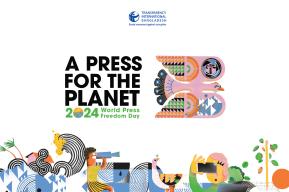News
Volunteers join UNESCO eDNA sampling in Tubbataha Reefs in Philippines

On 13 and 14 April, 8 volunteers joined the Philippine local park authority’s bi-monthly visit to the Tubbataha Reefs Natural Park -- a 20-hour return journey by ship from the nearest coast of Palawan. Aged 8 to 60 years old, the volunteers extracted eDNA from water samples at 5 different locations across the remote World Heritage area using specialized equipment provided by UNESCO. The volunteers joining the eDNA expedition were surrounded by the site’s unique wildlife, including spinner dolphins, tiger sharks and numerous marine turtles that traditionally inhabit the area.
UNESCO’s eDNA initiative helps our staff get exposure to the latest science to understand the biodiversity of Tubbataha Reefs Natural Park. The non-invasive method could provide a cost-effective means to monitor our remote World Heritage area and help us better protect it.
Environmental DNA is an innovative scientific method that can be used to monitor and evaluate ocean biodiversity without the need to extract organisms from their environment. Just one liter of water may contain genetic material from hundreds of species and may help determine the area’s biodiversity richness.
The UNESCO environmental DNA Expedition initiative is being rolled out across 25 marine World Heritage sites between September 2022 and April 2023. The eDNA data is expected to provide a one-off snapshot of biodiversity richness across marine World Heritage sites, particularly for fish species.
By combining the resulting biodiversity data with Intergovernmental Panel on Climate Change (IPCC) heat scenario projections, the initiative aims to provide a first glimpse of potential geographic and distribution shifts of fish species as a result of climate change which then in turn can inform conservation decision-making.
Resulting data will be available at the UNESCO Ocean Biodiversity Information System, the world’s largest open science marine species database. Final results are expected to be available in Spring 2024.
The UNESCO eDNA initiative is a joint collaboration between the Intergovernmental Oceanographic Commission and the World Heritage Centre. It is made possible with the support of the Government of Flanders (Kingdom of Belgium) and implemented in the context of the United Nations Decade of Ocean Science for Sustainable Development (2021-2030).
About Tubbataha Reefs Natural Park World Heritage site (Philippines)
Tubbataha Reefs Natural Park is one of the Philippines’ oldest ecosystems, and helps support fisheries outside its boundaries. The property was inscribed on the UNESCO World Heritage List in 1993 and is home to a great diversity of marine life. Whales, dolphins, sharks, turtles and Napoleon wrasse are amongst the key species found here. The reef ecosystems support over 360 species of coral and almost 700 species of fish. The reserve also protects one of the few remaining colonies of breeding seabirds in the region.






